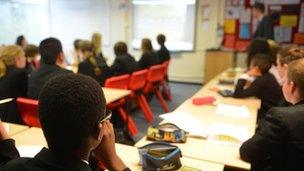‘Pub quiz facts curriculum’ opposed
- Published

Teachers say that there is an over-emphasis on core subjects
The revised national curriculum for schools in England is so narrow it will deter young people from learning, according to the National Union of Teachers' conference.
Delegates attacked it as "Gove's pub quiz curriculum", a reference to the Education Secretary, Michael Gove.
The NUT's general secretary Christine Blower said the curriculum was "desperately ill thought out".
The Department for Education said it "embodies high expectations".
The NUT, holding its annual conference in Liverpool, heard strong criticism of the planned new curriculum.
'Kings and queens'
Delegates claimed that its emphasis on core knowledge was a throw-back to rote learning and uncreative lists of facts.
Alex Kenny from the union's executive said it was a curriculum based on pub-quiz style chunks of information.
"It's a curriculum in which the learner is completely absent, or just a passive consumer of information or knowledge," he said.
The conference backed a motion attacking the curriculum for presenting a simplistic, culturally narrow, "kings and queens" version of subjects such as history.
It says that the curriculum for maths is over-prescriptive with too narrow a focus and that geography is reduced to a list of "capes, bays, rivers and mountain ranges".
For English, it says there is an "obsession with particular literary texts".
There were particular concerns that it would fail to engage with children who spoke English as a second language and pupils with special needs.
Martin Allen, a delegate from Ealing, described it as a "know your place curriculum", based on rote learning and "social control".
"Teachers are genuinely fearful that pupils will be forced to learn in a way that is inappropriate," said Ms Blower.
"Rote learning is the antithesis of experiential learning, learning through doing. It doesn't promote the critical thinking and problem-solving skills that are essential for good quality learning."
'Challenging and ambitious'
But the debate also heard support for the idea of teaching a core of knowledge.
Quentin Deakin from Bradford warned that in history pupils could be left "rudderless without some chronology".
The NUT published a survey of more than 2,000 members of the union showing widespread opposition to the curriculum.
It found that two-thirds of teachers believed there was "too much emphasis on 'facts' rather than skills". Fewer than one in 10 believed the changes would give teachers more freedom.
A Department for Education spokesman rejected the criticisms of the planned curriculum: "This could not be further from the truth.
"The draft national curriculum is challenging and ambitious and will give every child the broad and balanced education they need to fulfil their potential.
"We engaged with academics and experts and carefully analysed the world's most successful school systems before building a curriculum which embodies high expectations.
"Furthermore we are giving every school more freedom and trusting teachers to use their creativity to shape the curriculum to the needs of their pupils."
- Published31 March 2013
- Published7 February 2013
- Published7 February 2013
- Published27 February 2013